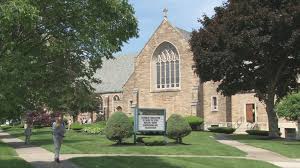In the middle of legal wrangling, mounting pressure, and uncertain futures, parishioners in Buffalo finally caught a break.
On Friday, the New York State Supreme Court stepped in with a temporary ruling that halted a highly controversial payment demand — one that would have forced several parishes to hand over large sums of money to the Diocese of Buffalo as part of a $150 million clergy abuse settlement.
Churches Fighting to Survive Face a Crushing Financial Deadline
At the heart of the conflict is a group of parishes that have already been fighting their own battle: opposing a diocesan restructuring plan that would merge or close their churches.
While their appeals to the Vatican are still pending, the Diocese ordered them to contribute up to 80% of their unrestricted cash toward the abuse settlement — a move they say could push them past the point of survival.
The deadline for these payments was originally set for July 15, and the calculation varied by the parish’s financial status.
Wealthier churches with more than $3 million in reserves were asked to pay 75%, while smaller parishes under $250,000 in cash would pay 10%.
But if a parish was closing or merging? That jumped to a flat 80%, regardless of size.
Bankruptcy Fallout and Bishop’s Statement
The Diocese of Buffalo declared bankruptcy in 2020 following a flood of clergy abuse claims.
Last month, Bishop Michael Fisher defended the required parish contributions, calling them a “necessary” part of healing and restitution for the victims.
He said the payments would help bring closure to a painful chapter in the diocese’s history.
Parishioners Push Back in Court
But for many local Catholics, the cost felt too steep — especially for parishes already facing closure.
A group representing several of them, including Blessed Sacrament in Tonawanda and Saint Bernadette in Orchard Park, took legal action, arguing that forcing payment while their Vatican appeals are ongoing would cause irreparable harm.
In their lawsuit, they warned that turning over 80% of their operating cash would “fatally destroy” their churches, leaving them unable to serve their communities or remain open long enough to hear a decision from Rome.
Supreme Court Steps In With Temporary Reprieve
As the case moved forward, both sides met in court on Friday and agreed to give the diocese more time to respond to the lawsuit.
In the meantime, Judge John DelMonte issued an injunction that blocks those controversial payments — at least for now.
The decision only applies to the parishes directly involved in the lawsuit, but Mary Pruski, a spokesperson for Save Our Buffalo Churches, says more communities are joining the cause.
“There are more parishes that can’t be protected because they’re not in the lawsuit,” she explained, adding that her group is working quickly to change that before the original payment deadline hits.
The court has given the diocese until August 6 to file its formal response.
A Larger Trend in the Catholic Church
The Buffalo situation isn’t happening in a vacuum.
Catholic parishes across the U.S. — from Illinois to Pennsylvania — have faced a wave of closures and mergers in recent years, driven by dwindling attendance, rising operational costs, and fewer priests to go around.
Some churches have even become more expensive to maintain than to close.
In a few cases, parishioners have found creative ways to keep their churches alive.
One group in Manitowoc, Wisconsin, started a GoFundMe to hire a canon lawyer to argue their case before the Vatican.
In Allentown, Pennsylvania, a group of locals bought an historic church from the diocese to preserve it as a place of worship.
Diocese Keeps Quiet Amid Legal Dispute
As for the Diocese of Buffalo, it’s remaining tight-lipped for now.
Spokesman Joe Martone told reporters they won’t comment while the case is still pending, citing “legal prudence” and the need to protect sensitive information.
That silence hasn’t eased the concerns of parishioners still caught in limbo.
But for those involved in the lawsuit, the court’s temporary injunction gives them something they haven’t had much of lately — a little more time and a little more hope.
